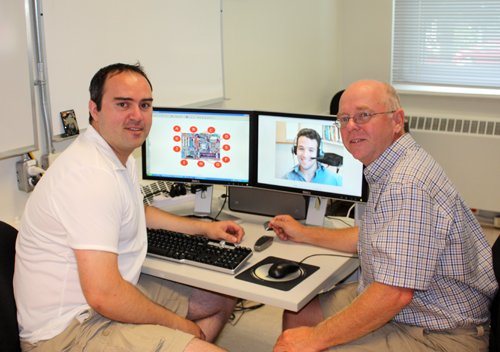This news release is more than 15 years old. Program information may no longer be accurate, and links may not work. For current program information, please refer to the program section.

Distance education students in Holland College's Computer Information Systems Distance program are more connected to the classroom than ever, thanks to the Telepresent Remote Classroom project that recently received support from the Island Prosperity Rural Broadband Fund.
Learning managers Mike Beamish and Chris Arsenault have been developing the project since 2008, with assistance from Holland College's President's Innovation Fund.
By incorporating audio and video components into classroom presentations, distance learners can log into lectures from home, see the same information that students in the classroom are seeing, and even ask questions in real time. The lectures can then be saved for later viewing.
"We're not saying this is brand new or cutting edge," explains Beamish. "All of the technology that we're using has and is being used in many other areas. However, now that it is affordable and stable, we have found a creative way to apply it to better engage our distance learners, the majority of whom live in rural areas."
The Computer Information Distance program is targeted to students interested in entering the technology sector, existing technology workers who want to upgrade skills, transitioning workers in traditional industries who want to change occupations, and part-time learners who wish to continue to work in rural areas and obtain training outside normal working hours. By targeting these market segments with innovative, engaging, and accessible methods to acquire new information technology skills and providing ways for existing workers to upgrade their current skill set, the project has significant benefits for rural areas of PEI as well as the information technology industry.
Through Telepresent, distance learners will be able to connect to live lectures and participate in discussions via web cams and desktop sharing applications, enabling them to be part of the in-class experience. Part-time learners who work during traditional class hours can review taped lectures during the evenings. In-class students will have the option of reviewing the recorded lectures to assist with understanding and retention.
Traditional distance education is static and non-engaging by nature. Instructors typically post lecture notes and assignments to the web via a learning management system. Distance students traditionally worked in isolation and independently to complete the assignments and send them back to the instructors. Student queries in these situations are generally handled by e-mail. This can be inefficient, causing frustration for students, because they may not be able to get the information they need until the following day, if they are doing their class work at night. Lack of communication or perceived lack of response leads to frustration and, in some cases, may cause students to drop the course.
The improved technology infrastructure and delivery methodology provided by the Telepresent classroom environment allows increased participation for distance students in live classroom lectures, student-to-instructor discussions and student-to-student discussions.
Learning Manager Chris Arsenault, who pulled the various components together for the pilot project, sees a distinct difference between Telepresent and other modes of distance program delivery.
"There's a difference between observing a podcast and participating in a class. Our solution is bisynchronous. Rather than passively observing what's going on in the classroom, distance learners will be able to ask questions, share their work with others, and engage in real time conversations," he explained.
The Island Prosperity Rural Broadband Fund has given $40,000 to the Applied Research division of Holland College to further develop the Telepresent classroom.
Dr. Audrey Penner, said the project fits well with the college's applied research agenda.
"A major activity of Applied Research at Holland College is to foster better education through innovation and industry relationships, the Telepresent classroom does both. Not only are we evaluating more closely a highly interactive distance learning model with the integration of multimedia, we are also redefining the potential for technology enhanced learning for our community college and more specifically for rural Prince Edward Island," she said.
In this picture: Holland College learning managers Chris Arsenault (left) and Mike Beamish demonstrate one of the components of the Telepresent Remote Classroom project that recently received support from the Island Prosperity Rural Broadband Fund.
For more information about this release, please contact:
Michelle Gallant, Media and Communications Officer
Tel: 902-629-4270
Date: Thursday, September 09, 2010